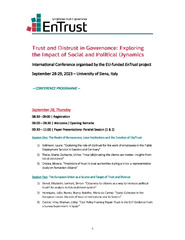Приказ основних података о документу
Constructing interpersonal and political trust across the life span: emotional and rational dimensions
| dc.contributor | Fikrlová, Jana | |
| dc.contributor | Štěpánková, Lenka | |
| dc.contributor | Padoan, Enrico | |
| dc.creator | Đorđević, Ana | |
| dc.creator | Ćeriman, Jelena | |
| dc.date.accessioned | 2023-11-07T17:32:42Z | |
| dc.date.available | 2023-11-07T17:32:42Z | |
| dc.date.issued | 2023 | |
| dc.identifier.uri | http://rifdt.instifdt.bg.ac.rs/123456789/3133 | |
| dc.description.abstract | Trust is a precondition of functional relationships and cohesive societies. Various studies point out the significance of the interaction between cognitive and affective dimensions in attempts to understand interpersonal and political trust. Further, the literature suggests that there is a leap between interpersonal and political trust, since the former is more direct, but also that the two are interlinked. However, the developmental dynamic between the emotional and the rational dimension in constructing interpersonal and political trust remains understudied. Additionally, most psychological research on determinants, correlates, and dimensions of trust is quantitative and neglects the substantive importance of social context in its development. The current research aims to bridge these gaps by providing in-depth insight into the processes of construction of interpersonal and political trust among different age groups and across three European countries. The sample, recruited via purposive and snowball sampling, consisted of a total of 119 participants (F=60) from four age groups (11-12; 14-15; 18-19; 30+) from Italy, the Czech Republic, and Serbia. A total of 24 focus groups (two per age group, eight per country) were conducted online, providing qualitative data on how participants construct their trust in interpersonal relationships and in the government. The results of the thematic analyses conducted separately for all countries expose two independent dimensions of trust building: emotional and rational. Furthermore, it shows that interpersonal trust is built primarily on the emotional basis (closeness, care, reciprocity, familiarity, sharing), while political trust is mostly built on the rational one (the assessment of knowledge, competence, and expertise of the authorities). However, the two are interlinked and can have a spillover effect so that when, e.g., a public official represents a familiar figure, the sense of familiarity, despite its centrality for interpersonal trust, can incite political trust. The findings will be discussed considering the differences between age groups and social contexts of the three countries. | sr |
| dc.language.iso | en | sr |
| dc.relation | EnTrust project, EU Horizon 2020, grant No. 870572 | sr |
| dc.rights | openAccess | sr |
| dc.rights.uri | https://creativecommons.org/licenses/by/4.0/ | |
| dc.source | Trust and Distrust in Governance: Exploring the Impact of Social and Political Dynamics, International Conference organised by the EU-funded EnTrust project, September 28-29, 2023 – University of Siena, Italy | sr |
| dc.subject | trust | sr |
| dc.subject | personal trust | sr |
| dc.subject | political trust | sr |
| dc.subject | qualitative research | sr |
| dc.subject | focus group | sr |
| dc.subject | cross-national comparative research | sr |
| dc.title | Constructing interpersonal and political trust across the life span: emotional and rational dimensions | sr |
| dc.type | conferenceObject | sr |
| dc.rights.license | BY | sr |
| dc.description.other | this conference was part of the EnTrust project, which Jelena Ćeriman and Ana Đorđević participated in, so the paper was automatically accepted as part of the conference and project outputs | sr |
| dc.type.version | draft | sr |
| dc.identifier.fulltext | http://rifdt.instifdt.bg.ac.rs/bitstream/id/10757/SienaEnTrustConf2023_merged.pdf | |
| dc.identifier.rcub | https://hdl.handle.net/21.15107/rcub_rifdt_3133 |

